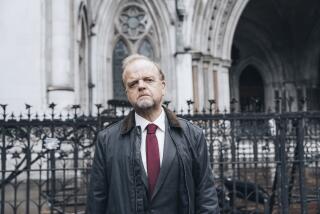Eric Lomax dies at 93; ex-POW’s act of forgiveness set stage for memoir ‘The Railway Man’

Notable deaths of 2012 (Ron Frehm / Associated Press)

Notable deaths of 2012 (David Longstreath / Associated Press)

Notable deaths of 2012 (Chris Pizzello / Associated Press)

Notable deaths of 2012 (John Duricka / Associated Press)

Notable deaths of 2012 (Lucy Pemoni / Associated Press)

Notable deaths of 2012 (Don Bartletti / Los Angeles Times)

Notable deaths of 2012 (Victoria Will / Associated Press)

Notable deaths of 2012 (Andre Luiz / Associated Press)

Notable deaths of 2012 (Ron Edmonds / Associated Press)

Notable deaths of 2012 (Tony Gutierrez / Associated Press)

Notable deaths of 2012 (Charles Rex Abrogast / Associated Press)

Notable deaths of 2012 (Jennifer S. Altman / For The Times)

Notable deaths of 2012 (Genaro Molina / Los Angeles Times)

Notable deaths of 2012 (Elizabeth Conley / Associated Press)

Notable deaths of 2012 (Eric Gay / Associated Press)

Notable deaths of 2012 (Jim Mone / Associated Press)

Notable deaths of 2012 (Walt Zeboski / Associated Press)

Notable deaths of 2012 (David Van Der Veen / AFP / Getty Images)

Notable deaths of 2012 (Matthew Cavanaugh / EPA)

Notable deaths of 2012 (Ray Howard / Associated Press)

With his silky voice and and casual style, the baritone most famous for his rendition of “Moon River” was one of America’s top vocalists from the 1950s into the 1970s. He was 84. Full obituary
Notable deaths of 2012

Notable deaths of 2012 (Carlo Allegri / Associated Press)

Notable deaths of 2012 (John Marshall Mantel / Associated Press)

Notable deaths of 2012 (Gary Friedman / Los Angeles Times)

Notable deaths of 2012 (Gus Ruelas / Associated Press)

Notable deaths of 2012 (Santi Visalli / Getty Images)

Notable deaths of 2012 (Ken Hively / Los Angeles Times)

Notable deaths of 2012 (Carolyn Cole / Los Angeles Times)

Notable deaths of 2012 (Genaro Molina / Los Angeles Times)

Notable deaths of 2012 (Jim Hollander / EPA)

Notable deaths of 2012 (Charles Sykes / Associated Press)

Notable deaths of 2012 (Bebeto Matthews / Associated Press)

Notable deaths of 2012 (Jay L. Clendenin / Los Angeles Times)

Notable deaths of 2012 (George Wilhelm / Los Angeles Times)

Notable deaths of 2012 (Diether Endlicher / Associated Press)

Notable deaths of 2012 (Hassan Ammar / Associated Press)

Notable deaths of 2012 (Ed Rode / Associated Press)

Notable deaths of 2012 (Nati Harnik / Associated Press)

Notable deaths of 2012 (Alexander Joe / AFP / Getty Images)

Notable deaths of 2012 (Olivier Ferrand / Capitol Records)

Notable deaths of 2012 (Gary Friedman / Los Angeles Times)

Notable deaths of 2012 (Jakub Mosur / For The Times)

Notable deaths of 2011 (Frazer Harrison / Getty Images)

Notable deaths of 2011 (Al Messerschmidt / Getty Images)

Notable deaths of 2011 (Jae C. Hong / Associated Press)
“Some time the hating has to stop,” reads the last line of “The Railway Man,” a moving tale of wartime torture and forgiveness by former British prisoner of war Eric Lomax.
Lomax was a British army officer when he was captured by Japanese forces during the fall of Singapore in 1942. The Scotsman endured horrific conditions and savage beatings as he and thousands of others were forced to build the infamous Burma-to-Siam railroad, which formed the basis of the 1957 film “The Bridge on the River Kwai.”
He went more than 45 years without speaking to a single Japanese person, Lomax later said. After years of suppressed rage, he tracked down the interrogator who repeatedly tortured him, setting the stage for the dramatic act of forgiveness at the heart of his celebrated 1996 memoir, “The Railway Man.”
His story is being made into a film of the same name, scheduled to be released next year and starring Colin Firth.
Lomax, 93, died Oct. 8 in Berwick-upon-Tweed in northern England, according to his publisher, Vintage Books.
“He lived long enough to see some early images from the film,” Andy Paterson, who is producing “The Railway Man,” told the British Press Assn., “and to share our hopes that this new version of his story will help ensure that the men who suffered with him ... would never be forgotten.”
Lomax was born May 30, 1919, in Edinburgh and returned there in 1945 after more than three years of torture by the Japanese.
While building the Burma-Siam railway, he was one of several prisoners of war held responsible for surreptitiously making and operating a radio. His crime had been to draw a map, and he was subjected to extreme thuggery and torture for it, Lomax said.
“The traditional POW attitude,” Lomax told the Christian Science Monitor in 1993, was “don’t forget, don’t forgive.”
After decades of hate, Lomax decided to face his interrogator, Nagase Takashi, whom he had tracked down, in 1993.
“I learnt that he was still alive, active in charitable works, and that he had built a Buddhist temple,” Lomax wrote on the website of the Forgiveness Project, a United Kingdom-based charity that promotes reconciliation. “After our meeting, I felt I’d come to some kind of peace and resolution. Forgiveness is possible when someone is ready to accept forgiveness.”
Lomax is survived by his wife, Patti; a daughter from his first marriage, Charmaine; and his stepchildren, Graeme, Nicholas, Mark and Jennifer.
More to Read
Start your day right
Sign up for Essential California for the L.A. Times biggest news, features and recommendations in your inbox six days a week.
You may occasionally receive promotional content from the Los Angeles Times.
More From the Los Angeles Times
-
April 21, 2024
-
-
-






